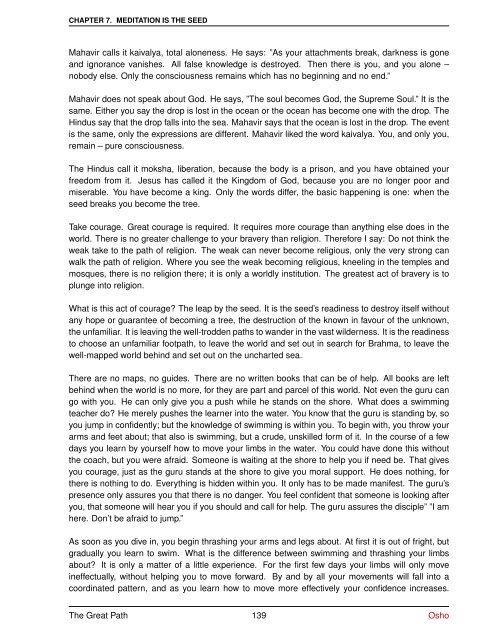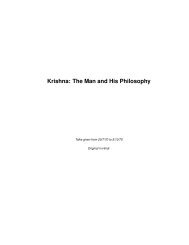The Great Path - Oshorajneesh.com
The Great Path - Oshorajneesh.com
The Great Path - Oshorajneesh.com
You also want an ePaper? Increase the reach of your titles
YUMPU automatically turns print PDFs into web optimized ePapers that Google loves.
CHAPTER 7. MEDITATION IS THE SEED<br />
Mahavir calls it kaivalya, total aloneness. He says: ”As your attachments break, darkness is gone<br />
and ignorance vanishes. All false knowledge is destroyed. <strong>The</strong>n there is you, and you alone –<br />
nobody else. Only the consciousness remains which has no beginning and no end.”<br />
Mahavir does not speak about God. He says, ”<strong>The</strong> soul be<strong>com</strong>es God, the Supreme Soul.” It is the<br />
same. Either you say the drop is lost in the ocean or the ocean has be<strong>com</strong>e one with the drop. <strong>The</strong><br />
Hindus say that the drop falls into the sea. Mahavir says that the ocean is lost in the drop. <strong>The</strong> event<br />
is the same, only the expressions are different. Mahavir liked the word kaivalya. You, and only you,<br />
remain – pure consciousness.<br />
<strong>The</strong> Hindus call it moksha, liberation, because the body is a prison, and you have obtained your<br />
freedom from it. Jesus has called it the Kingdom of God, because you are no longer poor and<br />
miserable. You have be<strong>com</strong>e a king. Only the words differ, the basic happening is one: when the<br />
seed breaks you be<strong>com</strong>e the tree.<br />
Take courage. <strong>Great</strong> courage is required. It requires more courage than anything else does in the<br />
world. <strong>The</strong>re is no greater challenge to your bravery than religion. <strong>The</strong>refore I say: Do not think the<br />
weak take to the path of religion. <strong>The</strong> weak can never be<strong>com</strong>e religious, only the very strong can<br />
walk the path of religion. Where you see the weak be<strong>com</strong>ing religious, kneeling in the temples and<br />
mosques, there is no religion there; it is only a worldly institution. <strong>The</strong> greatest act of bravery is to<br />
plunge into religion.<br />
What is this act of courage? <strong>The</strong> leap by the seed. It is the seed’s readiness to destroy itself without<br />
any hope or guarantee of be<strong>com</strong>ing a tree, the destruction of the known in favour of the unknown,<br />
the unfamiliar. It is leaving the well-trodden paths to wander in the vast wilderness. It is the readiness<br />
to choose an unfamiliar footpath, to leave the world and set out in search for Brahma, to leave the<br />
well-mapped world behind and set out on the uncharted sea.<br />
<strong>The</strong>re are no maps, no guides. <strong>The</strong>re are no written books that can be of help. All books are left<br />
behind when the world is no more, for they are part and parcel of this world. Not even the guru can<br />
go with you. He can only give you a push while he stands on the shore. What does a swimming<br />
teacher do? He merely pushes the learner into the water. You know that the guru is standing by, so<br />
you jump in confidently; but the knowledge of swimming is within you. To begin with, you throw your<br />
arms and feet about; that also is swimming, but a crude, unskilled form of it. In the course of a few<br />
days you learn by yourself how to move your limbs in the water. You could have done this without<br />
the coach, but you were afraid. Someone is waiting at the shore to help you if need be. That gives<br />
you courage, just as the guru stands at the shore to give you moral support. He does nothing, for<br />
there is nothing to do. Everything is hidden within you. It only has to be made manifest. <strong>The</strong> guru’s<br />
presence only assures you that there is no danger. You feel confident that someone is looking after<br />
you, that someone will hear you if you should and call for help. <strong>The</strong> guru assures the disciple” ”I am<br />
here. Don’t be afraid to jump.”<br />
As soon as you dive in, you begin thrashing your arms and legs about. At first it is out of fright, but<br />
gradually you learn to swim. What is the difference between swimming and thrashing your limbs<br />
about? It is only a matter of a little experience. For the first few days your limbs will only move<br />
ineffectually, without helping you to move forward. By and by all your movements will fall into a<br />
coordinated pattern, and as you learn how to move more effectively your confidence increases.<br />
<strong>The</strong> <strong>Great</strong> <strong>Path</strong> 139 Osho
















